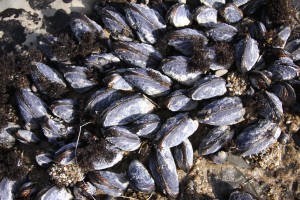
SACRAMENTO, CA – Testing by the California Department of Public Health (CDPH) detected elevated levels of domoic acid and paralytic shellfish poisoning in March, prompting officials to quarantine of all mussel species publicly harvested along the California coast.
The annual quarantine began March 29, 2011 coming a month earlier than in normal years. “Poisoning from eating mussels can lead to severe illness, including coma and death,” said CDPH Interim Director Dr. Howard Backer. “It is critical that individuals do not consume sport-harvested mussels because there are no known antidotes to the toxins found in these mussels and cooking does not reliably eliminate the toxins.”
Both domoic acid poisoning (DAP) and paralytic shellfish poisoning (PSP) are linked to natural food sources for filter-feeding animals, including bivalve shellfish. The overwhelming majority of illnesses among humans occur between spring and fall. DAP symptoms can occur within 30 minutes to 24 hours after eating toxic seafood. In mild cases, vomiting, diarrhea, abdominal cramps, headache and dizziness may occur. These symptoms disappear completely within several days. In severe cases, the victim may experience excessive bronchial secretions, difficulty breathing, confusion, disorientation, cardiovascular instability, seizures, and permanent loss of short-term memory, coma and death. PSP affects the central nervous system by producing a tingling around the mouth and fingertips within a few minutes to a few hours after eating toxic shellfish. Typical symptoms are loss of balance, lack of muscular coordination, slurred speech and difficulty swallowing. In severe poisonings, complete muscular paralysis and death from asphyxiation can occur. The mussel quarantine runs through October 31, 2011. It applies to sport-harvested mussels along the coast, including all bays, harbors and estuaries.
Commercially harvested shellfish are not included in the annual quarantine. These products are certified by the state and subject to strict requirements to ensure that all mussels, oysters and clams entering the marketplace are free of toxins.
For updated information on quarantines and shellfish toxins, call the CDPH shellfish information line at (800) 553-4133.
Web site: www.cdph.ca.gov